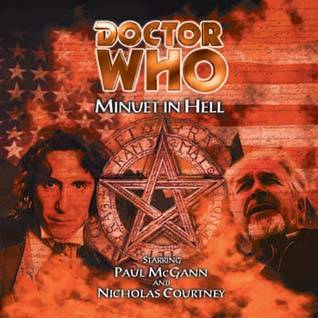|
| |
|
STORY PLACEMENT THIS STORY TAKES PLACE BETWEEN THE BIG FINISH AUDIO DRAMAS "THE STONES OF VENICE" AND "INVADERS FROM MARS."
PRODUCTION CODE 8E
WRITTEN BY ALAN W. LEAR & GARY RUSSELL
DIRECTED BY GARY RUSSELL
RECOMMENDED PURCHASE BIG FINISH CD#19 (ISBN 1-903654-05-X) RELEASED IN APRIL 2001.
BLURB THE 21ST CENTURY HAS BEGUN, AND MALEBOGIA IS ENJOYING ITS STATUS AS THE NEWEST STATE IN AMERICA.
AFTER HIS SUCCESSFUL INVOLVEMENT WITH HIS NATIVE SCOTLAND'S DEVOLUTION, ALISTAIR GORDON LETHBRIDGE- STEWART HAS BEEN INVITED TO MALEBOGIA TO OFFER SOME OF HIS UNIQUE EXPERTISE.
THERE HE ENCOUNTERS THE CHARISMATIC MR BRIGHAM ELISHA DASH- WOOD, AN EVANGELICAL STATESMAN RUNNING FOR GOVERNOR WHO MAY NOT BE QUITE AS WHOLESOME AS HE MAKES OUT. ONE OF DASHWOOD'S OTHER ROLES IN SOCIETY IS AS PATRON OF A NEW MEDICAL INSTITUTE, CONCENTRATING ON CURING THE ILLS OF THE HUMAN MIND. ONE OF THE PATIENTS THERE INTERESTS LETHBRIDGE- STEWART- SOMEONE WHO CLAIMS THAT HE TRAVELS THROUGH SPACE AND TIME IN SOMETHING CALLED A TARDIS.
CHARLEY, HOWEVER, HAS MORE THAN A FEW PROBLEMS OF HER OWN. AMNESIAC, SHE WORKS AS A HOSTESS AT THE LOCAL CHAPTER OF THE HELL FIRE CLUB, WHICH IS POPULATED BY LOCAL DIGNITARIES WHO HAVE SUMMONED FORTH THE DEMON MARCHOSIAS. AND THE LEADER OF THE CLUB? NONE OTHER THAN DASHWOOD, WHO SEEMS DETERMINED TO ACHIEVE CONGRESSIONAL POWER BY THE MOST UTTERLY MALEVOLENT MEANS AT HIS DISPOSAL... |
|
|
Minuet in Hell APRIL 2001 (4 EPISODES)
Minuet in Hell sees Paul McGann’s first full season playing the Doctor draw to an almighty close. With three eighth Doctor audio plays under their belt, Big Finish really pull out all the stops here to make this protracted four-parter something truly extraordinary.
Like both The Mutant Phase and Sword of Orion before it, Alan W Lear’s story is heavily based upon an old Audio Visuals 1980s fan production. However, the Big Finish version shifts the action to the United States of the near future; specifically, to the fifty-first American state, Malebolgia, which has recently seceded from another state somewhere in the Bible Belt. This of course begs the question as to why any God-faring residents would christen their state with a name derived from Malebolge (the name that Dante gave to the Eighth Circle of Hell in his Inferno), but as is the case with many, many elements in this story you simply have to indulge Lear’s dramatic license otherwise the whole thing falls apart. This might explain why fandom is so visibly divided as to the merits of this story – some are able to forgive what could be construed as substantial plot holes, whilst others don’t even want to.
And in fairness, certain things here do require a greater suspension of disbelief than usual. Most evidently, half of the story dwells on whether it is the psychiatric inmate played by Paul McGann or the more lucid character played by Nicholas Briggs that is the real Doctor, but at no point does either one of them suggest checking each other for the tell-tale Gallifreyan double pulse! Personally, I can overlook such quibbles, perhaps because I find the whole ‘identity crisis’ angle so provocative; after all, if Gideon Crane has the Doctor’s memories and his personality, then is he not the Doctor? Perhaps it’s the philosophy student in me, but I was really enthralled by this facet of the plot. What I really liked the most though was the idea that the Doctor really could be just a delusional madman locked in up an asylum, dreaming of all his epic adventures. Arrant nonsense, of course, but thought-provoking all the same.
Interestingly, I was astonished when McGann’s ‘Zebediah’ character was ultimately revealed to be the Doctor. It is so obvious that he should turn out to be the Doctor, that I was somehow expecting him not to be. This may be down to Nicholas Briggs’ persuasive performance as the ersatz Doctor - he’s evidently had lots of practice in the role through the Audio Visuals, and here this familiarity really shines through. His performance is careful and considered; completely and utterly convincing.
However, it is inevitably Nicholas Courtney who steals the show as Sir Alistair Lethbridge-Stewart – diplomat! As much as I enjoyed listening to Lethbridge-Stewart play opposite Colin Baker’s sixth Doctor in the recent Spectre of Lanyon Moor, I have to say that the retired soldier is used much more effectively here. With the Doctor out of the action for more than half the play, not only does the erstwhile Brig have a major role in terms of his investigations and in driving the plot forward, but he also lends the story its heart. Like both Storm Warning and The Stones of Venice before it, Minuet in Hell is a little bit clichéd, though this time it is in more of a ‘comic book’ way, and in this sense it resonates well with the TV Movie. None-theless, containing as it does a glut of horrendous and wholly unconvincing Yankee accents, Minuet in Hell needs Lethbridge-Stewart to bring a shred of realism to the proceedings as well as to give listeners an emotional anchor.
Now some have criticised this play for portraying Lethbridge-Stewart as a wise old man rather than an impulsive old soldier, and more so for depicting him and the Doctor as ‘best friends’ in the truest sense of the phrase. And whilst I agree that back in the day what made these two characters so compelling together was that they didn’t really get on but had this colossal respect for one another, that was then. People change as they get older, and none more so than the Doctor. For him hundreds of subjective years have passed since his exile days, and UNIT dating debacles notwithstanding, at least a couple of decades have passed for the Brig. As such, at the end of the final episode when the Doctor acknowledges ‘Alistair’ as his being “best friend” (infuriating Charley), I very nearly had a solitary manly tear trickle down my cheek. Self-referent nonsense at its best.
“We have no use for one who is already dead.”
On a final note, the cliffhanger ending to the season has really whet my appetite for the next; the denizens of Hell have certainly raised some serious doubts as to whether or not Charley should even exist. With the web of time coming unravelled and a surfeit of historical (and, it seems, continuity) errors following the Doctor and Charley about, surely something has got to give…
And so for me, Minuet in Hell stands head and shoulders above its peers. Its dark, twisting narrative really appeals to my personal tastes, and I for one am not going to complain about Charley and her Vampire-Slaying friend being forced to don leather fetish gear and being put to work in a whorehouse! It’s just a shame that such scenes had to be reserved for the audio medium.
In all
seriousness though, save for a slightly prosaic villain in Mr Dashwood and
some truly dreadful expository dialogue (“Here I am, eight foot of red
sweaty demon, pretty annoyed with you”), Minuet in Hell is
doubtless the season’s high point. It sees McGann given the opportunity to
do more than just run around grinning and saving the world and, even for
the most pitiless of fans, it offers the chance to listen to the new
Doctor sharing an adventure with his oldest, bestest friend.
|
|
|
Copyright © E.G. Wolverson 2006
E.G. Wolverson has asserted his right under the Copyright, Designs and Patents Act, 1988 to be identified as the author of this work. |
|
|
At the time of its release, many took Gideon Crane’s reference to a companion by the name of “Sam” as a reference to Samantha Jones, whom we posit is waiting for the Doctor at a Greenpeace rally somewhere whilst this adventure (and indeed all the eighth Doctor’s adventures with Charley) take place. However, the later audio drama Terror Firma revealed that prior to the events of Storm Warning, the Doctor spent some time travelling with brother and sister team Samson and Gemma, suggesting that Crane might be referring to Samson, not Samantha, and leaving it much more open as to when the eighth Doctor’s adventures with Charley might fall. However, we still believe that Crane’s remark is – as no doubt it was initially intended to be – referring to Samantha (after all, when does anyone ever call Samson “Sam”?), whom the eighth Doctor tracks down some time after his travels with Charley end in The Girl Who Never Was.
Furthermore, the later audio drama Neverland would explicitly date this story to 2003, placing it around six years after the events of the novel The Dying Days, which also saw the retired Brigadier Lethbridge-Stewart encounter the eighth Doctor. As such, irrespective of where The Dying Days falls in the Doctor’s personal timeline, it looks like the recall-busting effects of Mawdryn Undead and No Future had far-reaching effects on the old Brig’s memory… Thanks to Chris McKeon
|
|
|
Unless otherwise stated, all images on this site are copyrighted to the BBC and are used solely for promotional purposes. ‘Doctor Who’ is copyright © by the BBC. No copyright infringement is intended. |
|

.jpg)

